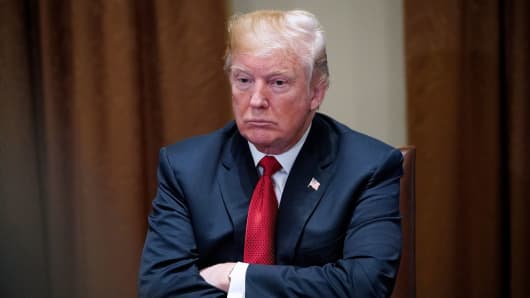RBC Capital Markets trimmed its year-end target for the S&P 500 to 2,890 from 3,000, as it sees a tougher road for the market to post gains.
"The list of political obstacles for stocks has continued to pile up and seems unlikely to improve anytime soon," Lori Calvasina, the investment bank's head of U.S. equity strategy, wrote in a note Tuesday. Calvasina noted some of the obstacles include the potential for greater regulation in tech, a Democratic sweep in the November midterm elections and a trade war with China.
Tech is down nearly 7 percent over the past month, after a scandal in which political research firm Cambridge Analytica was able to gather personal information from millions of Facebook users without their consent. Cambridge Analytica has denied any wrongdoing.
The news raised worries that the government would start keeping a closer eye on how Facebook — and other major tech companies like Google-parent Alphabet — deal with the data collected from users.
Tech has been the best-performing sector of the past year, surging nearly 30 percent. Calvasina downgraded the sector from market weight to underweight, noting high stock valuations and "fading leadership on fundamentals and earnings."
"To be clear, both still appear positive for the sector, but Tech is no longer the leader of the pack on either front, something that was a key underpinning of the bullish narrative on the sector in recent years," Calvasina said.
The decline in tech has contributed to the broader market's pullback. The S&P 500 is down more than 5 percent in the past month.
The midterm elections in November also pose a risk for stocks, Calvasina said. An RBC survey of stock investors found only 8 percent think Democrats taking control of both the House and Senate would be good for stocks.
Republicans maintained control of both chambers of Congress after the 2016 election. They also got control of the White House for the first time in eight years, helping them pass measures like lower corporate taxes. A reversal in government leadership could hinder the GOP's ability to pass similar legislation.
Lastly, Calvasina said the chance of a trade war between the U.S. and China is also a risk for stocks. The S&P's decline in the last month reflects Wall Street's concern about this possibility. On Tuesday, however, stocks rose sharply after Chinese President Xi Jinping discussed plans to further open the country's economy to foreign businesses.
To be sure, Calvasina's lower target on the S&P 500 still represents a gain of 8 percent for 2018. "We expect 2018 to be a good year … but believe returns will be less robust than those seen in 2017."

